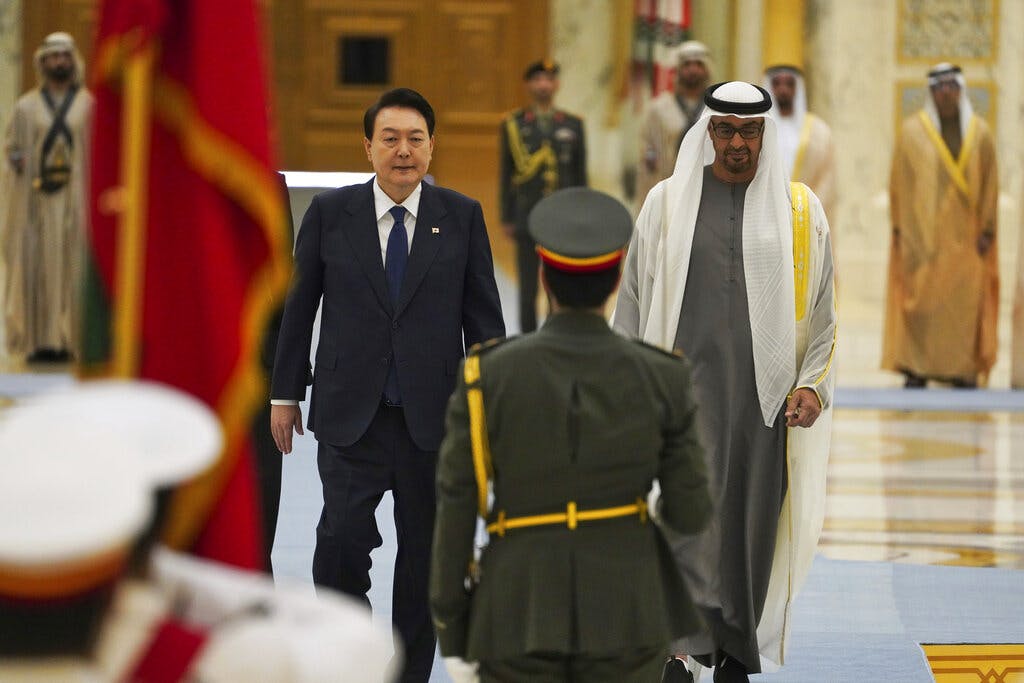South Korea Boosts Status as Arms Exporter
The latest client is the United Arab Emirates, which is bolstering defenses against Iran and its proxies.

South Korea’s president, on a sales mission to the critical United Arab Emirates, is building on his country’s success as a major exporter of arms.
Accompanied by the titans of South Korea’s biggest chaebol, or conglomerates, President Yoon watched over the signing of agreements with the UAE worth $6.1 billion for South Korean defense and energy interests. The UAE has already agreed to invest $3.5 billion for a missile system meant as defense against Houthi forces in control of north Yemen, and it plans to invest another $30 billion in South Korean business and industry.
Mr. Yoon and the leaders of Samsung, Hyundai Motor, SK, LG, and 80-90 other chaebol bosses visited the $20 billion nuclear power complex built under South Korea’s Korea Electric Power Corporation, but the highlight of his four-day mission was the South’s expanding role as a global arms dealer.
South Korea’s Yonhap News said the “Special Strategic Partnership” formed between the two countries covered not only nuclear power but arms and hydrogen and solar power, with projects ranging from space to health care to water resources to intellectual property.
A sign of the military importance of the deal, Yonhap said, would be its role in “strengthening cooperation in the Middle East, on the Korean Peninsula and in multilateralism.” In a bow to South Korea’s concerns, the UAE and South Korean leaders issued a statement that North Korea’s “relentless pursuit of nuclear and missile development poses a serious threat to peace and stability.”
With the new UAE agreements, South Korea ranks as the world’s seventh largest exporter of arms, and Mr. Yoon has said the country aims to rank fourth in another four years. South Korean arms exports shot up to about $18 billion last year, in large measure thanks to a $12.8 billion deal with Poland for the sale of planes, tanks, and artillery.
Just as the Poland deal reflected that country’s fears that the Russian invasion of Ukraine would escalate, so the deals with the UAE show its strategic position in the maelstrom of Middle East rivalries. The primary concern is Iran, which is in league with the Houthis in North Yemen and other subversive groups.
The pomp and circumstance of Mr. Yoon’s visit showed the strength and depth of the relationship between South Korea and the UAE, which has carved out a role as a welcoming gateway to much of the Arab world in opposition to Iran. A sure sign of the UAE’s evolving role was that it signed a free trade agreement last year with Israel — the first such deal between Israel and an Arab nation.
It’s not just the UAE’s geographic position, however, that makes it so important in the region. The UAE also ranks as the world’s seventh largest oil producer and is the source of 10 percent of South Korea’s oil imports.
Against this background, Mr. Yoon and his wife got a full-dress welcome when the UAE leader, Sheikh Mohammed bin Zayeb Al Nahyan, greeted them in Abu Dhabi to the tune of the UAE and South Korean anthems. Mr. Yoon and his wife also visited a small South Korean military unit that’s been quietly training UAE troops for the past 12 years.
By far the most significant visible element in the UAE-South Korean relationship is the nuclear power plant. Mr. Yoon and Sheikh Mohammed bin Zayeb Al Nahyan visited the power plant for the opening of the third of its four units, which ultimately will provide a quarter of the UAE’s power.
South Korea has failed to win deals for exporting more nuclear power plants, but Mr. Yoon predicted “greater achievements such as through cooperation on additional nuclear power plants in the UAE and joint expansion overseas.” Appropriately, the plant is named Barakah, meaning “blessing from God.”

